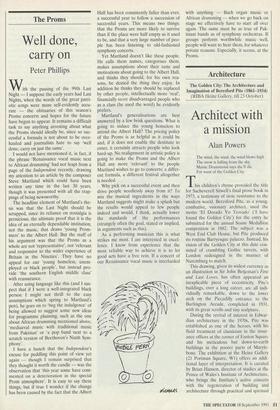The Proms
Well done, carry on
Peter Phillips
With the passing of the 99th Last Night — I suppose the early years had Last Nights, when the words of the great patri- otic songs were more self-evidently accu- rate — the obituaries of this season's Proms concerts and hopes for the future have begun to appear. It remains a difficult task to say anything arresting about what the Proms should ideally be, since so suc- cessful a formula is not about to be over- hauled and journalists hate to say 'well done; carry on just the same'.
I would not have mentioned it, in fact, if the phrase 'Renaissance vocal music next to African drumming' had not leapt from a page of the Independent recently, drawing my attention to an article by the composer Steve Martland which could have been written any time in the last 30 years, though it was presented with all the trap- pings of being newsworthy.
The headline element of Martland's the- sis was that the Last Night should be scrapped, since its reliance on nostalgia is pernicious, the ultimate proof that it is the idea of an eternally dependable institution, not the music, that draws 'young Prom- mers' to the Albert Hall. But the stuff of his argument was that the Proms as a whole are not 'representative', not 'relevant and responsive to the wider experience of Britain in the Nineties'. They have no appeal for our 'young homeless, unem- ployed or black people', but instead pro- vide 'the southern English middle class' with reassurance.
After using language like this (and I sus- pect that if I were a well-integrated black person I might not thrill to the easy assumptions which spring to Martland's pen), he goes on to 'beg the indulgence' of being allowed to suggest some new ideas for programme planning, such as the one about African drumming mentioned above, `mediaeval music with traditional music from Pakistan' or 'a pop band next to a scratch version of Beethoven's Ninth Sym- phony'.
I have a hunch that the Independent's excuse for peddling this point of view yet again — though I remain surprised that they thought it worth the candle — was the observation that 'this year some have com- mented on a deterioration in the special Prom atmosphere'. It is easy to say these things, but if true I wonder if the change has been caused by the fact that the Albert
Hall has been consistently fuller than ever, a successful year to follow a succession of successful years. This means two things: that the Proms are more likely to survive than if the place were half empty as it used to be, and that a very large number of peo- ple has been listening to old-fashioned symphony concerts.
Yet Martland doesn't like these people. He calls them names, categorises them, makes assumptions about their taste and motivations about going to the Albert Hall, and thinks they should, for his own rea- sons, be denied the thing they enjoy. In addition he thinks they should be replaced by other people, intellectually more 'real', financially more disadvantaged people who as a class (he used the word) he evidently prefers.
Martland's generalisations are best answered by a few brisk questions. What is going to induce the young homeless to attend the Albert Hall? The pricing policy of the Proms is as helpful as it could be and, if it does not enable the destitute to enter, it certainly attracts people who look hard-up. No realignment in artistic policy is going to make the Proms and the Albert Hall any more 'relevant' to the people Martland wishes to go to concerts; a differ- ent formula, a different festival altogether is needed.
Why pick on a successful event and then drive people needlessly away from it? To mix the musical ingredients in the ways Martland suggests might make a splash but the results would appeal to few people indeed and would, I think, actually lower the standards of the performances (strangely often the goal, stated or implied, in arguments such as this).
As a performing musician this is what strikes me most. I am interested in excel- lence. I know from experience that the most reliable way to achieve it is to let good acts have a free rein. If a concert of our Renaissance vocal music is interlarded with anything — Bach organ music or African drumming — when we go back on stage we effectively have to start all over again. The same must be as true of Pak- istani bands as of symphony orchestras. If groups perform worthwhile music well, people will want to hear them, for whatever private reasons. Especially, it seems, at the Proms.


































































 Previous page
Previous page